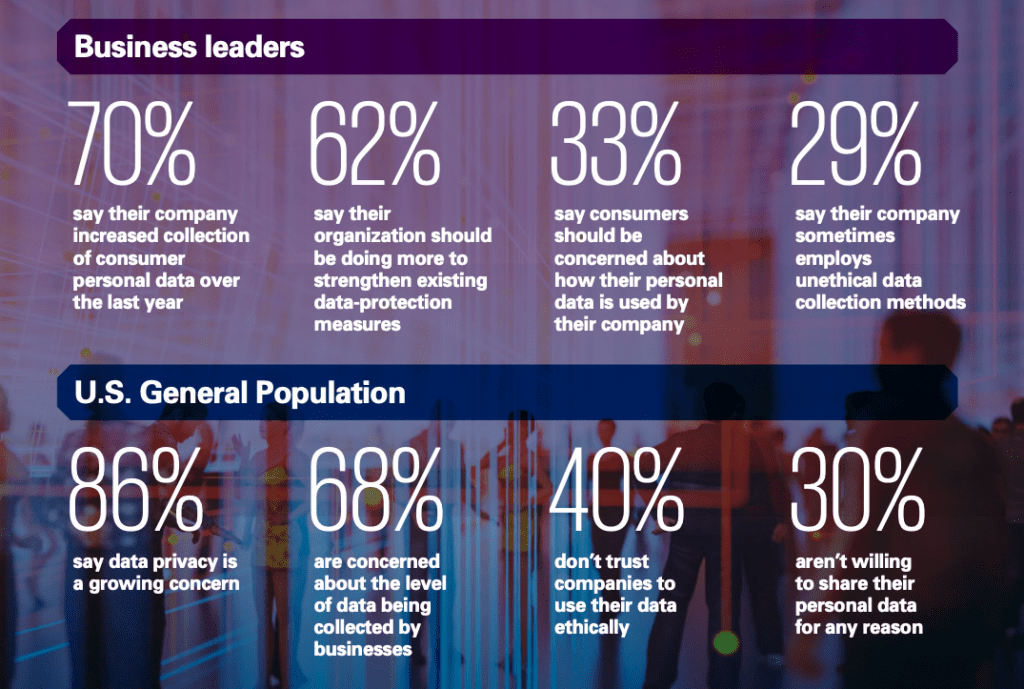A report released Tuesday by KPMG looks at the growing concerns among consumers about data collection and offers advice for businesses on how to address those concerns. The report, named “Corporate Data Responsibility: Bridging the Trust Chasm,” is based on two online surveys conducted by KMPG in April and May 2021. The first survey elicited responses from 2,000 U.S. adults; the second from 250 decision-makers involved with security, privacy and data at companies with 1,000+ employees.
“Business leaders and the American public are not on the same page.
Seventy-five percent of business leaders say they are comfortable with the level of data their company collects, yet 68 percent of the U.S. General Population say they are concerned about it. Companies that aren’t able to keep pace risk alienating consumers, potentially prompting a more conservative stance on sharing personal data—a troubling prospect for businesses reliant on consumer data to refine their marketing strategies and enhance their products.
“This split between business and consumer sentiment isn’t new, but its persistence shows that businesses have a long way to go if they want to make the public more comfortable with how they are collecting, using and safeguarding data,” says Orson Lucas, KPMG US Privacy Services Leader. “Failure to bridge this divide could present a real risk of losing access to the valuable data and insights that drive growth.”

Many consumer concerns are grounded in mistrust of business ethics.
When it comes to using personal data ethically, 40 percent of the U.S. General Population say they don’t trust companies to do the right thing, and 13 percent don’t even trust their own employer. So deep is this mistrust that 47 percent of those surveyed believe their smart devices are listening to their conversations, even though that notion has been discredited by research.
“While there is no standard definition of unethical consumer data use, it shouldn’t be terribly difficult to identify,” says Martin Sokalski, Principal, Advisory, Emerging Technologies and Digital Solutions Leader. “If companies would not want their data practices in the headlines—out of fear of what consumers might think—it makes sense to reconsider.”
In addition to concerns about how businesses are collecting and storing data, there are even greater fears that this data might be compromised or sold. Many of the U.S. general population say they are very concerned about how companies collect (40%) and store (39%) their data, respectively. But even more are very concerned about the possibility that companies holding their data could be hacked (47%) or that their data could be sold (51%). To be fair, selling data to a third party is a tangential practice for most businesses these days: only 17 percent of business leaders say their company engages in this practice. Businesses may need to be more direct and transparent on this point to ease consumer fears.
“Communicating with the consumer around data use and protection is an ongoing responsibility,” Sokalski says. “It’s critical to closing the trust gap.”
Business leader views suggest there is reason for consumer concerns.
While 95 percent of business leaders say their company has strong or very strong data protection measures in place, 62 percent concede that their companies should be doing more. This validates consumer concerns about corporate practices. In addition, when speaking about their own employer, 33 percent of business leaders corroborate that consumers should be concerned about how their personal data is used by their company, and 29 percent openly acknowledged that their company sometimes uses unethical data-collection methods.
“People tend to underreport behaviors that place them or their organization
in a negative light,” says Lucas. “It is a disturbing finding that more than one in four survey respondents work for a company that sometimes uses unethical data-collection methods. This goes a long way toward explaining why consumers are wary.”
The chasm between businesses and consumers may continue to grow.
Seventy percent of business leaders say their company increased its collection of personal consumer data over the past year. But without intentional action to safeguard data and educate consumers, the gap between business practices and consumer expectations could continue to grow.
“The collection and use of consumer data has become so integral to business operations that it is hard to imagine companies will pull back unless forced to do so,” says Rob Fisher, US KPMG IMPACT Leader. “But the longer companies lag behind consumer expectations, the risk of losing access to that data will grow exponentially. The challenge moving forward will be to better align practices with the expectations of customers and potential customers.”

 English
English French
French German
German



